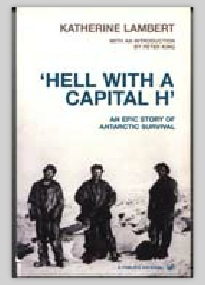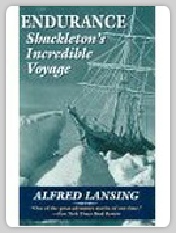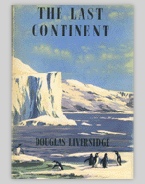L
LAGERBOM, Charles L.
The Fifth Man: Henry R. Bowers
Bowers was with Scott at the Pole and died on the return journey. A new biography. Published Caedmon of Whitby 1999.
LAMBERT, Katherine.
'Hell With A Capital H'.An epic story of Antarctic Survival.
It can be said that there is an over- abundance of epic Antarctic survival stories however, this one is the best. Led by Victor Campbell, (an inspired choice by Scott) the Northern Party survived an Antarctic winter in a snow drift burrow. Make no mistake, this is a real tale of hardship, heroism and endurance. It is a story of classical proportions and deserves another airing and analysis. The question is, does this book do expedition justice? It would be so easy when writing yet another modern résumé of one aspect of heroic age exploration to criticise and question using modern views and hindsight. Scott, especially used the Navel class system as a means of maintaining discipline and control. Campbell, did likewise with the Northern party.
We can today look back with amazement at how 'officers' and 'men' were treated differently. Katherine Lambert's book makes a study of the relationships within the party, she points out these 'class' differences without modern analysis and this is important. It wasn't until after the First World war that people began to question and change these attitudes. There was in Campbell's 'man management' system a precarious balance and I feel that this is adequately expressed in this book. It is not perfect though, and the poor author is never going to live it down that in a footnote on page 138 she describes that 'When Oates's body was found, it was discovered that he cut his boots open (easier to force his frozen feet in). Hmmm, the fact that Oates body had ever been found is news to me. Despite that, this is a good book and yes, it does this marvellous, inspiring story justice and that is what counts.
Published by Pimlico in 2002.

LANCING, Alfred,
Endurance. Shackleton's Incredible Voyage
Despite the many other books written about Shackleton's incredible journey across the ice, this remains the best. It is a non-exaggerated story, told as it was, and with no intrusive personal comment- just the facts. Lansing noticeably lets the story speak for itself. A lot of modern authors on Antarctica could do better by studying Lansing's style.
Published by Hodder & Stoughton in 1959. Whittleysey House (USA) published ' Shackleton's Valient Voyage' in 1960. Weidenfield & Nicholson published an illustrated version in 2000.

LASERON, Charles Francis,
South with Mawson- Reminiscences of the Australian Antarctic Expedition 1911-1914
First edition published 1947 George Harrup, later published by Angus and Robertson (1957). Life aboard the 'Aurora' with the Australian's of the 1911-13 expedition.
Antarctic Eyewitness: South With Mawson And Shackletons Argonauts
Angus & Robertson Publishers Two stories of the 'heroic era', of sustained survival and the triumph of the human spirit set against seemingly impossible odds. One is Sir Douglas Mawson's 1909-14 Australian Antarctic Expedition. The other is Sir Ernest Shackleton's unsuccessful attempt to cross the Antarctic continent from 1914-16, and the extraordinary survival of his entire party after the expedition's ship Endurance was crushed and sunk in pack ice. A timely, superbly chronicled and immensely readable double volume.South With Mawson was published in 1947. Shackleton's Argonauts was published in 1948. Both expeditions were chronicled by Frank Hurley, indomitable Australian photographer (This is from publishers blurb).
LASHLY, William,
Under Scott's Command: Lashley's Antarctic Diaries. (Ed by A.R. Ellis)
Lashly's own work was limited to 75 copies and therefore very rare. A facsimile edition edited by Commander Ellis was published by Victor Gollancz in 1969.
LEES, Orde Thomas
Elephant Island and Beyond (The Diaries of Thomas Orde Lees) Edited by John Thomson.
Poor old Orde Lees does not feature greatly in the annals of heroic age exploration of Antarctica. We first come across him on Shackleton's expedition of 1914 and the news is not good - he recognises he is not the most popular person amongst the 22 men awaiting rescue on Elephant Island. Shackleton had gone off in a jaunt around the Southern Ocean in a small boat looking for assistance and had taken Harry McNeish with him. Now there was a grumpy old sod if there ever was one. Shackleton recognised that old McNeish had to be got out of the way if he was to return to Elephant Island and find his men not torn apart buy dissent and argument. With McNeish out of the way it was Orde Lees who was voted the next 'weakest link' to the point where he feared he would be the first victim of cannibalism if the food situation were to get a bit tight.
Shackleton seemed to put down this man as a troublemaker at every opportunity. The truth is Orde Lees was an extraordinary man. He played a significant part in keeping the men alive on Elephant Island and his journals were eventually recognised as unbiased, truthful recollections of what happened.
Orde Lees was also a significant early advocate in the use of parachutes for pilots in the RAF. He went on to obtain an exemplary war record.
Published by Bluntisham Books.
LEWIS, Richard S.
A Continent For Science: The Antarcic Adventure
An American scientist's summery of polar exploration. Published 1965 Secker & Wartburg
LIMB, Sue & CORDINGLY, Patrick.
Captain Oates, Soldier and Explorer.
This is a well-researched book and is a worthy addition to the Antarctic library. One reason why the research is so detailed is that Oates's sister and some of his personal friends contributed towards the book. The authors, I believe have captured the essence of the man. He was intelligent, courageous and had strength of character, he quickly saw Scott for what he was worth, and with the occasional grumble got on with the job and did it to the best of his abilities. The manner of his death is covered well in the book and leaves the reader full of remorse for what was probably a needless death, yet with admiration for the man who knew what he had to do in order to stop being a burden on the others. Of course, the blunt version is that Oates should have done what he did earlier.
The book was first published in 1982 by William Batsford and reprinted in 1982 and 1983. The book was re-published in 1995 by Leo Cooper (Pen and Sword Paperback).
LIVERSIDGE, Douglas
The Last Continent.
A typical 50's book now showing its age and of no particular merit. Yet another summary of exploration. Published 1958 Travel Book Club/ Jarrolds.
